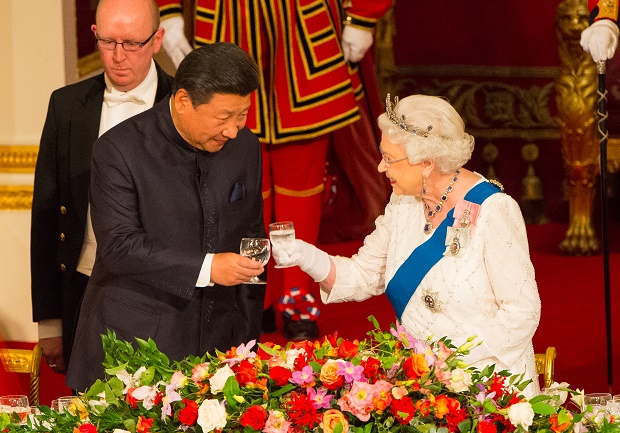
Chinese President Xi Jinping with Britain’s Queen Elizabeth II during a state banquet at Buckingham Palace, London, on the first day of the state visit to Britain, Tuesday Oct. 20, 2015. AP
LONDON, United Kingdom—Chinese President Xi Jinping enjoyed a glittering state banquet hosted by Queen Elizabeth II at Buckingham Palace on Tuesday in a visit to Britain focused on business deals and stronger trade ties.
READ: UK visit to set course for ties, says China’s President Xi
“Mr. President, your visit is a defining moment in this very special year for our bilateral relationship,” Elizabeth told Xi in a speech, wearing a white banquet dress encrusted with crystals.
“I am confident that it will serve to highlight the sincerity and warmth of our friendship and to strengthen relations between our countries for many years to come,” the monarch added.
READ: WATCH: Royal family to gather in strength for China’s Xi
Xi recalled British-Chinese cooperation at different points in history before proposing a toast to the royal family, clinking glasses with the queen.
The 170 guests included Prince William and his wife Kate wearing a red gown and tiara, British Prime Minister David Cameron and finance minister George Osborne in white bow ties, Xi’s wife Peng Li yuan and other Chinese dignitaries.
Music for the evening included Scottish military pipers and a string orchestra that played Chinese folk songs and tunes from British band The Beatles, and the menu featured venison from the queen’s Scottish estate and fine wines.
Human rights protests
Xi rode to the palace in a gilded carriage past thousands of supporters with Chinese flags, and around 200 protesters who booed and waved placards attacking China’s human rights record.
Xi also addressed parliament in a rare honor for visiting dignitaries, promising to lift relations between Britain and China to “a new height.”
The British government said the visit will secure trade and investment deals worth more than £30 billion (40 billion euros, $45 billion) and lead to the creation of more than 3,900 jobs.
The most keenly awaited deal is an agreement for a new nuclear power plant in Britain in which French business daily Les Echos said China could take a one-third stake together with energy giant EDF.
Serenaded by an official harpist, Chinese leader also took tea with Prince Charles, a friend of the Dalai Lama and who did not attend the state banquet in what was widely interpreted as a diplomatic snub.
Cameron has been accused by some observers of kowtowing to China in a bid for investment and the visit comes at a particularly sensitive time as thousands of jobs are being cut in Britain’s steel sector, partly due to low Chinese steel prices.
The concern was mentioned by main opposition Labour party leader Jeremy Corbyn in a meeting with Xi before the state banquet in which he “raised the issues of human rights and the impact of Chinese imports on the UK steel industry,” according to a Labour spokesman.
Leading Hong Kong pro-democracy activist Joshua Wong, 19, who attended a protest against Xi near Buckingham Palace, told AFP that the prospect of Chinese cash “has blinded the eyes of David Cameron”.
“I just hope the British government and the British people can stand up for democracy because so many people in China are silenced and cannot stand up.”
At the protest, campaigners waved the Tibetan flag and held placards reading: “End the Crackdown” and “Cameron: Don’t Trade Away Human Rights.”
But they were outnumbered by thousands of pro-Chinese demonstrators sporting hats, T-shirts and flags.
‘Strategic opportunity’
The four-day state visit includes a trip to Downing Street, Cameron’s country residence Chequers, and even Manchester City football club on Friday, in a city that is keen to attract more Chinese investments.
In a sign of increasingly close business ties, the People’s Bank of China on Tuesday launched a yuan-denominated bond in London for the first time as it seeks to internationalise its currency.
The sale worth 5.0 billion yuan (690 million euros) offered a yield of 3.15 percent and was said to be the first time that a yuan-denominated bond auction has taken place outside of China and Hong Kong.
Britain’s courtship of China is being masterminded by finance minister George Osborne, Cameron’s closest ally and a favourite to succeed him as prime minister, who spent five days in China last month.
The visit comes amid increasing evidence that China’s economy, the world’s second-largest, is slowing down.
Official figures Monday showed it grew 6.9 percent in the third quarter of this year—its slowest pace since 2009.
But Rajiv Biswas, Asia-Pacific chief economist at analysts IHS Global Insight, called the visit “a very important strategic opportunity” with China still forecast to become the world’s largest economy by 2027.
The Chinese-British relationship has been rehabilitated since Cameron met the Dalai Lama in 2012, sparking an angry response from Beijing.